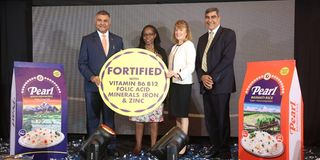Capwell Industries introduces fortified rice to curb malnutrition

From Left - Rajan Shah (CEO, Capwell Industries), Veronica Kirogo (Director of Nutrition and Dietetics Services, MoH), Lauren Landis (Country Director, World Food Programme) and Chetan Shah (Director, Capwell Industries) during the launch of Pearl Fortified Rice in Nairobi on June 6, 2024.
What you need to know:
- Capwell Industries is the first manufacturer in Kenya to launch fortified rice.
- WHO recommends fortifying staple food as a way to enhance micronutrient intake.
Capwell Industries Limited, a Thika-based food and beverage manufacturer, has started fortifying its Pearl Rice brands with essential vitamins and minerals.
The move comes on the back of a need to reduce vitamin and mineral deficiencies among vulnerable groups like women and children in Kenya.
According to the 2011 Kenya National Micronutrient Survey, 33 per cent of children aged between 0.5 to 5 years and 42 per cent of pregnant women are anaemic due to lack of essential nutrients such as iron.
Meanwhile zinc deficiency affects 83 per cent of children in this age group and 68 per cent of pregnant women. Additionally, 32 per cent of non-pregnant girls aged 15-19 years have folate deficiency, while 48 per cent have vitamin B12 deficiency.
Capwell Industries became the first manufacturer in Kenya to launch fortified rice in their prominent brands Pearl, Pishori and Super Basmati.
These two variants of Pearl rice will now be fortified with vitamins B6, Folic Acid, B12, iron, and zinc in all packets ranging from 1 to 10 kilograms.
Changing eating habits
"By fortifying our Pearl Rice brands, we ensure that consumers, especially those who rely on rice as a staple, can easily incorporate these nutrients into their diets, without compromising on flavor, colour, or shelf-life," said Capwell's Chief Executive Officer, Rajan Shah.
Globally, food fortification has been identified as one of the most cost-effective nutrition interventions for preventing and controlling micronutrient deficiencies.
In line with global nutrition targets, the Sustainable Development Goal number 2 and the Kenya Kwanza manifesto pillar of Food Security, Veronica Kirogo, Director of Nutrition and Dietetics Services at the Ministry of Health, said the government is committed to eliminating malnutrition by supporting initiatives such as the one driven by Capwell Industries.
“The Ministry is considering rice, the third most important cereal crop in Kenya with a per capita consumption of 28kg, as a potential vehicle for fortification,” said Kirogo.
With annual rice consumption rising by 12 per cent due to changing eating habits, the World Health Organization (WHO) recommends fortifying the staple food as a way to enhance micronutrient intake.
Lauren Landis, Country Director at the World Food Programme, commended Capwell for its leadership in rice fortification, emphasizing the positive impact on public health and economic standards.
Micronutrient deficiencies
She advocated for the inclusion of fortified rice in school meal programs to further enhance public health outcomes.
Capwell's efforts in rice fortification resonate with the standards set by the Kenya Bureau of Standards (Kebs) and play a crucial role in preventing and controlling micronutrient deficiencies, thus ensuring better health for all Kenyans.
A policy brief on rice fortification was developed in 2023, and Kebs has drafted an East Africa Standard for rice fortification, awaiting adoption at the regional level.
With over 30 nutritious food products in its portfolio, the company aligns with the Kenya National Food Fortification Strategic Plan and Guidelines of 2018-2022.
Additionally, Capwell's ISO 22000 certification underscores its dedication to providing safe and healthy food options.




